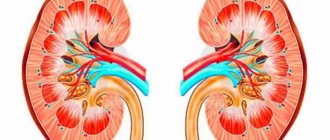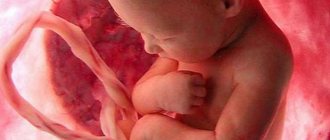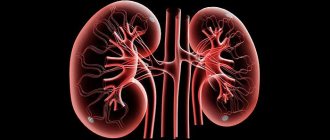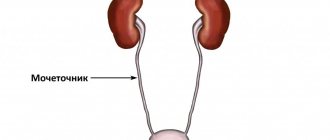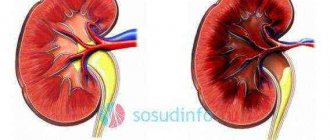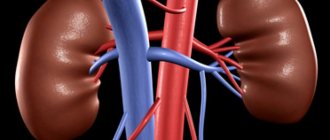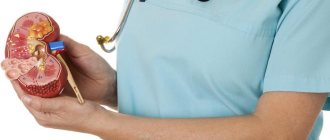Features of the anatomical structure
The kidneys are a paired organ with a dense and smooth surface. They are bean-shaped. It is protected by a fibrous capsule - a thin but fairly strong connective tissue film. Also, as a protective layer, each kidney is surrounded by adipose tissue, which also supports the kidneys in a certain anatomical location.
The internal structure of the organ is very complex. The main renal tissue is a two-layer parenchyma, which performs a filtering function. The structural unit of filtration tissue is the nephron. There are more than a million of them in each kidney. This structural unit also has a complex structure. The nephron consists of renal tubules and corpuscles.
It is in the tubules that the blood plasma is filtered and primary urine is formed. It is not excreted from the body, but moves through the tubules, where the absorption of substances and water necessary for the body occurs. Waste toxic substances remain in the tubules - secondary urine, which enters the collecting ducts and enters the renal pelvis - urine storage. From the pelvis, urine is transported to the bladder.
In addition to filtering and excretory functions, kidneys are needed to perform other tasks:
- Regulation of homeostasis – maintaining the constancy of the composition and properties of the internal environment of the body. They participate in the regulation of water and electrolyte balance, maintaining a balance between substances removed from the body and those entering the body. This is how the body maintains not only water, but also ionic and osmotic homeostasis.
- Regulation of acid-base balance. The elimination of sulfuric and phosphoric acid, which are formed during protein metabolism, is of great importance for the body.
- Participation in the regulation of blood pressure. Through complex biochemical processes, this paired organ is involved in the long-term and rapid regulation of blood pressure.
- Increment into the blood of a number of biologically active substances (enzymes, vitamins, hormones, etc.).
- Participation in the regulation of blood clotting.
- Stimulation of the process of red blood cell synthesis.
- Stimulation of protein metabolism. They participate in the breakdown of proteins reabsorbed from secondary urine and the formation of amino acids, enzymes and hormones, followed by their secretion into the blood.
All about kidneys
September 21, 2020 47282
The kidneys are real workers: with each of them weighing no more than 200 g per day, they process up to 1000 (!) liters of blood! And they not only cleanse it of indigestible metabolic products, but also ensure homeostasis - the constancy of the internal environment of the body, participate in the regulation of blood pressure, and in case of liver damage, they partially take over its functions.
What foods are good for the kidneys?
- Products containing vitamin A are very useful for the kidneys, which the kidneys are ready to “absorb” as much as they want and will only be grateful to you for it.
Minks helped us learn about their love for vitamin A.
Poor animals died in nurseries because their renal pelvis and urinary tract were literally clogged with stones.
As soon as vitamin A concentrate was added to their food, the epidemic stopped, the minks became happier, and their fur began to shine.
Our body synthesizes most of vitamin A from carotene. Its sources: carrots, sweet peppers, sea buckthorn, parsley, spinach, dill, sorrel, onions and especially cilantro.
- Another good product for maintaining kidney health is pumpkin: puree, juice, and porridge (pumpkin-millet or rice). Pumpkin has a diuretic effect and does not irritate the kidneys and urinary tract. Watermelon and melon of not very sweet varieties have the same wonderful properties. Apples and plums are also good for the kidneys.
- The kidneys feel blissful when you are on all fours. The knee-elbow position is extremely comfortable for them: it helps normalize the flow of urine.
- They are great lovers of movement - dancing, skiing, gymnastics, of course, in a suitable outfit - according to the season and the weather, which does not pull the internal organs into a sticky mass at the bottom, when you cannot breathe out.
What to drink for kidney health
Our body is 80% water. Only by absorbing a sufficient amount of liquid (no less than 1.5-2 liters per day), you maintain the necessary water-salt balance, which is so important for the kidneys and the whole body.
What to drink if your kidneys hurt?
Of course, not alcohol: it destroys the kidneys (and not only them), and in excessive quantities causes acute renal failure - a life-threatening condition. Non-fruit, sweetened carbonated drinks - the substances they contain irritate the kidneys.
And not mineral water - if it’s a lot and without a doctor’s prescription.
An increased amount of certain salts in various mineral waters can contribute to the formation of stones in the kidneys and urinary tract, especially if there are prerequisites for this - narrowing of the ureters, bacterial infection, metabolic disorders in the body.
It is useful to drink boiled water, tea, milk (by the way, S.P. Botkin assessed it as a “precious remedy for the treatment of kidney diseases”), cranberry and lingonberry fruit drinks. They remove excess fluid from the body, reduce the concentration of urine and, to some extent, prevent the formation of stones.
What is harmful to the kidneys
The ring on your finger can be the first to “tell” about kidney problems: if it suddenly becomes small, it is possible that the cause is swelling that accompanies certain kidney diseases.
- Don't tolerate it, it's bad for your kidneys! Empty your bladder regularly (at least 4-6 times a day). Stagnation of urine allows microbes to “settle” in the kidney tubules. And this predisposes to the development of pyelonephritis - an infectious and inflammatory kidney disease.
- Don't overwork yourself! This undermines the immune system and is harmful to the kidneys. Remember: hordes of bacteria are just waiting for the right moment to go on the offensive.
- Systematic constipation leads to spasms of the muscles of the intestines and urinary tract. The result may be a weakening of the tone of the kidney muscles and impaired urination.
- Do not rush to sit down on an unheated cold pebble, sand, or dewy grass. This is often the start of inflammatory kidney diseases. Cold, especially in combination with dampness, hurts the kidneys.
- Kidneys are real sissies: they don’t like extreme heat either. They prefer the “golden mean”. When the temperature rises above 30°C, the body loses a lot of fluid through sweat, and the amount of salt excreted through the kidneys hardly increases, which can contribute to the development of urolithiasis.
Foods harmful to the kidneys
Now let's talk about which foods are harmful to the kidneys:
- Don't try different diets indiscriminately, it's bad for your kidneys!
Sudden weight loss leads to kidney prolapse. A long-term salt-free diet disrupts their activity and contributes to the appearance of protein in the urine. The complete absence of sodium chloride (table salt) in the body is one of the causes of kidney failure.
- Nephrologists in the Arctic and Central Asia have especially many concerns. It is in these regions that kidney stone disease is most common. It turns out that it’s all about vitamin D, which is involved in phosphorus-calcium metabolism. This vitamin is contained in liver, butter, egg yolk, and in addition, it is independently synthesized by the body under the influence of ultraviolet rays. Both a lack of vitamin D (as, for example, in the Arctic, where the sun is a rare guest), and its excess (in hot Central Asia) can cause kidney diseases.
- Vitamin C in tablets in excessive quantities is sometimes a provoking factor in the formation of kidney stones, especially if there is a hereditary predisposition to urolithiasis.
- According to some experts, such a favorite product as chocolate with nuts is harmful to the kidneys.
According to American scientists, even if a person’s blood pressure is slightly elevated, but this continues for a long time, the risk of developing kidney failure increases three times.
- “How many times have they told the world”: self-medication is dangerous.
The kidneys do not tolerate sulfonamides well. So that they dissolve better and do not settle in the kidney tubules (which can cause severe pathology), drink more, then the medicine will be excreted in the urine. Etazol and Biseptol are considered the most gentle on the kidneys.
- Do not take medications containing sex hormones without consulting your doctor. In some men who resorted to them in the hope of increasing sexual potency, and in women who used large doses of such drugs as contraceptives, a sharp imbalance of sex hormones provoked kidney cancer.
- * Be careful with mushrooms! Dubious specimens are out of the basket! Poisoning with poisonous mushrooms is fraught with the development of such a terrible condition as acute renal failure, and then salvation is only in hemodialysis, carried out using an artificial kidney.
Alarm bells for the kidney
Pay attention to changes in the color of your urine; this may indicate kidney problems.
If the urine is pink, red, or cloudy, it may contain blood. This may be a sign of an infection or tumor in the urinary system. Don't put off visiting your doctor!
If your urine is dark yellow or orange, there is no cause for concern. If you don't drink enough fluids, your urine becomes more concentrated and therefore darker.
Dark brown urine is characteristic of hepatitis. To confirm or refute the diagnosis, you need to urgently take urine and blood tests.
Green or blue urine is not a joke of nature and not a sign of illness. It’s just that your diet contained foods containing artificial food colors of such original colors.
Causes of kidney diseases
There are not many reasons why the kidneys can rebel, and all of them are usually associated with an unhealthy lifestyle, including diet, but there are other cases:
- Kidney problems threaten thin and tall people, or, as experts say, people of asthenic physique. The fatty capsule, which helps maintain the kidneys in a normal position, is relatively underdeveloped in them. This means nephroptosis (prolapse of the kidneys) is a very real threat.
- According to statistics, kidney disease affects more women than men. This is explained by the physiological and anatomical characteristics of the female body. For most, malfunctions of the kidneys (for example, pyelonephritis) begin during pregnancy, when the outflow of urine is disrupted due to the growing uterus.
- Middle-aged and older men are also at risk. Kidney problems arise in them against the background of prostate adenoma - male disease N1, and other “age-related” diseases of the genitourinary system, which are accompanied by impaired urine outflow.
- Kidney diseases threaten everyone who does not treat teeth and nasopharyngeal diseases on time. Caries (as well as inflammatory foci in the tonsils, as well as in any other organs) often leads to kidney disease. Infectious agents, traveling with the bloodstream throughout the body, often “settle” in them. Sore throat is especially dangerous - its complication can be such a serious disease as glomerulonephritis.
- Lazy people should also think about it. It has been established that physical exercise improves both metabolism and kidney function. You move - the kidneys are better supplied with blood and produce urine more actively. People who engage in feasible, not too strenuous physical labor or work on weekends in their summer cottages develop kidney stones less frequently, or at least at a later age, compared to those who lead a sedentary lifestyle. Physical inactivity often leads to disturbances in phosphorus-calcium metabolism, the appearance of excess calcium in the blood and urine and the formation of kidney stones.
Prepared by Svetlana RYABUKHINA, Tatiana IGNATOVA
Source: https://zdravyshka.ru/poleznye-sovety/sovety-vracha/vse-o-pochkax.html
How do the kidneys work?
When discussing what functions the kidneys perform, this must be discussed first. Since the formation of urine is the main “duty” of this organ.
Initially, water and other liquids are filtered through three layers of the glomerular filter (renal corpuscle, a kind of “sieve”). Mostly proteins and plasma pass through it.
Then primary urine collects in the tubules. From them, the liquid necessary for the body is absorbed, as well as various nutrients.
The last stage is called “tubular secretion”. During this process, all substances unnecessary for the body pass from the blood into secondary urine, which then accumulates in the bladder.
To put it simply, everything that can be useful to us remains in the blood and is distributed among the vessels. And harmful substances that can harm the body or cause disease, illness, or a virus come out in the form of urine.
Thus, it becomes clear why the kidneys are often called our filter.
The kidneys have two main tasks: first they filter the blood, and then they remove unnecessary and harmful substances from the body as urine, provided that they work properly. However, these are not their only functions, since they also perform such actions as:
- Urine formation. Thanks to this process, the body separates harmful substances from useful ones, regulates the required volume of water, and ultimately removes everything unnecessary from the body. If the kidneys did not filter, human lifespan would be drastically reduced as the toxins we consume deplete our bodies.
- Maintaining normal blood pressure. Some people experience constant, even chronic high blood pressure. The fact is that the kidneys must provide the necessary balance of electrolytes, thereby regulating this process.
- Regulation of acidic environment. If a large amount of excess acids remains in the body, a favorable atmosphere for bacteria is created. They, in turn, multiply and cause the development of dangerous diseases. To prevent this from happening, the kidneys remove excess acids.
- Production of hormones and vitamin D. Functions such as the formation of blood cells in the bone marrow and the maintenance of bone health also belong to the human excretory system.
The well-being of our immunity largely depends on all these processes, so we should never forget that this is the merit of the kidneys. It is important to follow some preventative and health measures.
If you treat this with disdain, then with age the consequences will appear on their own. To understand how to prevent kidney failure, you should familiarize yourself with the causes of this phenomenon.
Homeostatic and metabolic functions
In addition to filtering and excretory functions, kidneys are needed to perform other tasks:
- Regulation of homeostasis – maintaining the constancy of the composition and properties of the internal environment of the body. They participate in the regulation of water and electrolyte balance, maintaining a balance between substances removed from the body and those entering the body. This is how the body maintains not only water, but also ionic and osmotic homeostasis.
- Regulation of acid-base balance. The elimination of sulfuric and phosphoric acid, which are formed during protein metabolism, is of great importance for the body.
- Participation in the regulation of blood pressure. Through complex biochemical processes, this paired organ is involved in the long-term and rapid regulation of blood pressure.
- Increment into the blood of a number of biologically active substances (enzymes, vitamins, hormones, etc.).
- Participation in the regulation of blood clotting.
- Stimulation of the process of red blood cell synthesis.
- Stimulation of protein metabolism. They participate in the breakdown of proteins reabsorbed from secondary urine and the formation of amino acids, enzymes and hormones, followed by their secretion into the blood.
These are also very important processes. When discussing what function the human kidneys perform, we cannot forget about homeostatic and metabolic ones. This organ regulates blood metabolism, namely, it removes excess bicarbonate ions and protons from the blood. In addition, it affects the fluid balance in the human body by controlling the content of ions.
And also the metabolism of carbohydrates, lipids, proteins, the breakdown of peptides, amino acids - this is the function the kidneys perform! It is in this organ that beneficial vitamin D is converted into the D3 form, which is so necessary for a person to maintain a healthy immune system. Kidneys are also actively involved in the process of protein synthesis. So not only the formation of urine is the “responsibility” of this organ.
What to do if your kidneys are not working properly?
What is the correct attitude towards such an important organ? There are points that you should constantly pay attention to:
- Poor nutrition. It consists of consuming foods containing large amounts of salt, sugar, alcohol, and protein. For example, a large amount of meat in the diet can cause the kidneys to be unable to cope with this protein load. As a result, the formation of stones and the development of urolithiasis.
- Alcohol abuse. When it is broken down in the body, toxic substances enter the kidneys and cause inflammation and functional disorders. Another negative effect that alcohol has is dehydration. As a result, the kidneys have to filter thickened blood, which negatively affects their condition.
- Sedentary lifestyle. The kidneys have a negative attitude towards the stagnation of blood that occurs during sedentary work.
As we can see, in order for the kidneys to perform their functions without restrictions, one must first of all lead a healthy lifestyle. Today it is considered not only useful, but also prestigious.
2pochki.com
Synthesis and protection
This is the last thing that needs to be mentioned when talking about the function of the kidneys in the body. In addition to the above, this organ is also involved in the synthesis of prostaglandins, renin, calcitriol and erythropoietin.
To put it in simple and understandable language, it helps to form various hormones and enzymes that are vital for us. These substances regulate arterial pressure, stimulate blood, maintain circulation balance, and control the amount of calcium in the body.
Source: https://pochki.top/zachem-nuzhny-pochki-cheloveku/
Importance for normal functioning
Microbes, pathological pathogens, and toxic substances pass along with the blood. These harmful blood elements are eliminated from the body. The peculiarity of the structure of the kidneys is that these substances cannot enter the kidneys back from the ureters. With such global work, the kidneys need a margin of safety. It happens that one of the organs fails due to injury or disease, then a healthy one takes over its function. It works by performing double the volume of all functions. How to protect this important organ from diseases and damage?
The right attitude towards the kidneys
What is the correct attitude towards such an important organ? There are points that you should constantly pay attention to:
- Poor nutrition. It consists of consuming foods containing large amounts of salt, sugar, alcohol, and protein. For example, a large amount of meat in the diet can cause the kidneys to be unable to cope with this protein load. As a result, the formation of stones and the development of urolithiasis.
- Alcohol abuse. When it is broken down in the body, toxic substances enter the kidneys and cause inflammation and functional disorders. Another negative effect that alcohol has is dehydration. As a result, the kidneys have to filter thickened blood, which negatively affects their condition.
- Sedentary lifestyle . The kidneys have a negative attitude towards the stagnation of blood that occurs during sedentary work.
As we can see, in order for the kidneys to perform their functions without restrictions, one must first of all lead a healthy lifestyle. Today it is considered not only useful, but also prestigious.
We need kidneys to survive. They perform several extremely important functions. Their main tasks are to remove waste products from the blood and maintain the balance of salt and water levels in the body.
Location of your kidneys
Most people have two kidneys, although it is possible to live a normal life with one. The buds are shaped like beans and are about the size of a fist. To determine where the kidneys are, do the following: Place your hands on your hips and move them upward until you can feel the ribs with your fingers. The kidneys are located at the back, behind the thumbs. You cannot feel them, but they are there, well hidden inside the body.
How your kidneys work
Depending on your weight, 4-6 liters of blood circulate in your body. Blood is transported to and through the kidneys by the renal arteries. Every day, about 1,500 liters of blood pass through the kidneys and are cleaned by approximately one million microscopic filters. These filters are called nephrons, and they are so small that you need a microscope to see them. Most kidney diseases are caused by damage to the nephrons. When they lose their filtering properties, the body can develop dangerous levels of fluids and waste products.
The blood needs purification
When your body gets the nutrition it needs from the food you eat, some waste products are released back into the blood. One of the key functions of the kidneys is to continually remove these waste products from the blood. We can say that the kidneys are the “cleaning station” of the blood. If the kidneys do not remove waste products, they will accumulate in the blood, causing serious harm to the body.
The kidneys also have other functions.
The kidneys have other functions besides cleaning the blood. An important function of the kidneys is to maintain the balance of fluids and minerals in the body.
Release from waste products and water
Substances that are filtered by the kidneys mix with water and turn into urine. Urine leaves the kidneys through small tubes (ureters) and is collected in the bladder. Urine, containing waste products and water, is eliminated from the body through the urethra.
The kidneys always have work to do
The kidneys also produce active vitamin D, which is necessary for the absorption of calcium from food. Calcium, among other things, is important for building your bones. In addition, the kidneys help regulate blood pressure and stimulate the production of red blood cells. Thus, without a doubt, kidney function is important for good health.
The kidneys are the organ responsible for waste disposal in the body. What foods should you eat to avoid the formation of kidney stones?
Kidneys, what are they?
Kidneys are one of the components of the urinary system; there are two of them in the body (left and right). Location – area of the spine at the lumbar level.
Why do people need kidneys?
The vital activity of the body is accompanied by the processing of various substances entering it. The kidneys are responsible for removing waste products. They also regulate water-electrolyte and acid-base balance, and also keep blood pressure normal.
Thanks to the kidneys, the blood passing through them is cleared of toxic substances and then follows its route. And everything harmful and unnecessary comes out along with urine. In just a minute, the kidneys can clean approximately 1200 ml of blood. But if the kidneys are unhealthy, then the corresponding functions of cleansing the body are not performed. In some cases this ends in death.
Symptoms of kidney disease
- Change in urine color
When urine changes color, this indicates not only that the kidneys are sick, but other organs may also be damaged. In normal kidney condition, the urine is clear and light yellow.
A test will help determine whether urine is clear or not:
- hold the jar of urine close to the text, if the text is clearly visible and easy to read, then this is a positive result, the urine is transparent;
- if during the experiment it is impossible to make out more than one letter, due to the fact that the urine is concentrated or cloudy, the body most likely suffers from dehydration;
- brown urine indicates liver disease;
- blood in the urine means the process of inflammation of the urinary tract, the formation of kidney stones, and the occurrence of cancer of the urinary system.
- Pain in the lumbar region
If your lower back hurts, this does not mean that you have osteochondrosis. Perhaps the pain is caused by unhealthy kidneys. In order to determine which organ is sending painful signals, tap your fingers in the area of the kidneys (right and left costo-lumbar angle). If the actions cause pain, then treatment of the kidneys or adjacent abdominal organs is necessary. With osteochondrosis, pain comes from the center of the abdominal space.
What causes kidney pain?
The pain comes from the fact that a stone formed in the kidneys begins to move along the ureter.
What foods contribute to the formation of stones?
- The following foods contribute to the deposition of oxolate stones in the kidneys: tea (black), beets, sorrel, spinach.
- Urate stones form in the kidneys due to meat products.
Preventing stone formation
- Eat as many oranges, yoghurts, and beans as possible.
- For normal functioning of the urinary system, drink at least two liters of water during the day.
- Home
- Medicine
- Mysteries of the subtle world
- beauty and health
- Sex and health
- Image of a woman
Online consultation:
The head physician of the center, a doctor of the highest category, Valentin Ivanovich Vdovin, will conduct an online consultation on topics that interest you.
Contacts: Skype (valentin200440)
Our address: Rostov region, Taganrog, Dzerzhinsky street, 154-6 (8634) 36 46 01
License No. LO-61-01-001709
The human body is 80% water. The kidneys are the organ that controls that the volume of fluid does not fall significantly below this figure and does not rise above it. After all, an excess of water is just as harmful as its deficiency.
Filtration
When the amount of water in the body increases, there is a risk of edema, during which infections can easily enter the body and develop. Therefore, to avoid fluid stagnation, healthy kidneys quickly remove excess fluid through urine. When the amount of moisture in the body drops, the kidneys are very careful about its consumption, saving literally every drop, and we go to the toilet less often.
In addition to controlling the amount of fluid, the kidneys constantly cleanse the blood, pushing it through itself as if through a filter. In 5 minutes, all the blood that we have in the body passes through the kidneys. The filtration process is continuous and per day they pass 180 liters of blood through themselves, excreting at least a liter of various “garbage” in the urine.
Blood needs constant cleansing: after all, it not only carries nutrients throughout the body, but also takes “waste products from their production” from cells. Accordingly, if you do not cleanse your blood as often as possible, many harmful substances may soon accumulate in it, which will begin to poison us from the inside.
The process of cleansing and monitoring moisture consumption takes place simultaneously: first, through a clever filtration system, the kidneys remove from the blood all the liquid with harmful substances dissolved in it, remove the latter and return to the blood the amount of clean water that it needs. No more, no less. If there is any excess liquid left after this, it is removed along with the filtration waste. When there is little water in the body, the kidneys do not save on blood, returning maximum moisture to it. And removing only the amount that is needed to evacuate “garbage” (in “dry” form, urine cannot leave the body). When moisture is in short supply, there is a high risk that “not everything will come out,” that is, some particles of waste will remain in the depths of the kidneys, subsequently forming stones. That is why doctors advise drinking at least 2 liters of water a day - this is the optimal amount, it is enough to “fill” the blood and eliminate everything unnecessary.
Color therapy
The work of the kidneys is as important for our body as the work of the heart. And perhaps more. It’s not for nothing that we have only one “fiery engine”. And there are 2 kidneys. However, their number does not mean that you can relax. No one is immune from kidney disease. Therefore, you need to monitor them very carefully. But you won’t be able to examine them directly yourself: they are protected by subcutaneous fat and muscles. Therefore, it is worth carefully examining what directly “came out” of them. That is, urine. After all, its color can tell a lot:
- When the kidneys are doing their job, the urine is slightly yellow and transparent, so much so that you can literally read a newspaper through it. Don’t be shy, pour the “waste product” into a transparent vessel and look through it at any text. If you see all the letters, then there is nothing to be afraid of. Your kidneys work without failure.
- When the urine is cloudy and concentrated (it’s difficult to read through it), but at the same time yellow in color, drink more fluid, your body is on the verge of dehydration and soon the kidneys will not have enough fluid to fully remove “garbage”. And this is where many kidney diseases begin, for example, urolithiasis.
- Brown urine does not mean anything good. It indicates that some problems have arisen. It is necessary to consult a doctor and get tested.
- If there is blood in the urine, this is also an alarming sign. A symptom that inflammation has begun somewhere in the urinary system - and it can be associated with a host of unpleasant diseases, from stones to cancer.
Pain in the lumbar region can also indicate poor kidney health. Many people confuse them with symptoms of osteochondrosis. To understand what exactly was the cause, remember exactly how the pain “torments” you: if it is concentrated in the center of the back, in the area of the spine, this is a manifestation of osteochondrosis, but if it appears on the sides, it is worth checking the kidneys for stones.
Prevention
Kidney disease cannot be treated without the help of a doctor. Self-medication in this case can have the most dire consequences. Doctor's help is individual, it depends on the results of the tests. Preventing kidney diseases is definitely easier than treating them later. And the preventive measures are simple and publicly available:
- Eat a balanced diet. Eat less fatty, fried, spicy and salty foods. Try not to overeat. The kidneys will be grateful for vegetables, fruits, fresh, juicy herbs, sea fish, sweet peppers, apples, cabbage, watermelons and melons.
- Drink at least two liters of clean water per day (not carbonated).
- Avoid hypothermia in your lower back. The kidneys are afraid of the cold.
- Move more, sports exercises, especially those that affect the waist and hips, are good for kidney function.
- If your health allows, toughen up.
Original article: Kidneys. Why do people need them?
What do the kidneys do that we lose along with the kidneys? And what can be done if the kidneys are not doing their job?
• The kidneys remove excess fluid from the body
.
Everyone probably knows that the kidneys make urine. Kidneys not working means no urine. This means that fluid accumulates in the body, swelling appears. Up to a certain stage of the disease, diuretics help, but in the future only an artificial or donor kidney can save you from death. • The kidneys remove waste substances from the body.
As the body works, it produces waste—unnecessary substances that need to be removed.
Some of this waste is toxic; its high concentration in the body leads to poisoning of other organs. The kidneys are "garbage collectors" that remove these wastes through urine. This waste cannot be destroyed with pills, nor can it be removed surgically. If your kidneys can't handle the cleansing process, you need another kidney. • The kidneys regulate levels of electrolytes and other chemicals
.
The kidneys ensure the balance of chemical elements such as sodium, potassium, calcium and phosphorus in the body. For your cells to function properly, it is important that the correct balance of these elements is maintained. If the kidneys cannot cope with this job, they can be helped by limiting the intake (from food) of elements into the body that are already too abundant in the body. Some diuretics increase the removal of electrolytes (particularly potassium and sodium) from the body. Dietary restrictions become more severe the more the kidneys degrade. When diet alone is not enough, special medications can be used to enhance the removal of substances such as phosphorus and potassium from the body. • The kidneys produce hormones.
The kidneys produce hormones that help regulate blood pressure. They also help produce red blood cells, the red blood cells that carry oxygen throughout the body. The kidneys produce a hormone called erythropoietin (Epo), which stimulates the production of red blood cells. Without erythropoietin, red blood cell production decreases. This results in a condition known as anemia. Anemia causes severe fatigue and general weakness. An artificial kidney cannot produce hormones. Fortunately, there is an artificial form of erythropoietin, injections of which can usually cure renal anemia.
Why do humans need kidneys? - Kidneys
Many parents find it difficult to understand that their child is suffering from kidney pain, but there are some signs that appear when there is discomfort in the lumbar area. Firstly, the child begins to act up, seemingly for no reason.
Later it turns out that there is a reason: the baby experiences pain during urination. Then, at some point, the parent notices that the smell and color of the urine takes on an unnatural and atypical character for the child.
Gradually, this condition begins to become alarming.
If there are still any doubts about the presence of kidney stones, you should pay attention to some factors. An elevated temperature may not be a common cold, and frequent and even constant refusals to eat are not just a child’s whim. If he cannot explain the reason for his behavior, then his parents should do so.
The main functions of the kidneys in the body and signs of their impairment
The human kidneys are a paired organ that purifies the blood, maintains water-alkaline balance, and takes part in metabolism and hematopoiesis. The functions of the kidneys are diverse and closely interconnected, so disruption of their functioning leads to failures in many systems of our body at once.
What do kidneys do in the human body?
A lot depends on the normal functioning of the organ, since nature entrusts them with several functions at once. All of them can be provided thanks to the structure of this organ and its abilities.
Kidney functions are:
- excretory;
- metabolic;
- regulatory (homeostatic);
- secretory.
Excretory capabilities of the kidneys
The main function of this organ is to remove excess fluid and metabolic products. It is called excretory or excretory. The kidneys pass through a huge volume of blood per day (up to 1500 liters), filtering from it first about 180 liters of primary urine, and eventually from 0.5 to 2 liters of secondary urine.
This function is based on two stages: filtration and reabsorption. At the exit from the bladder, urine must have a certain composition and density. This is necessary to remove all unnecessary and harmful waste products from the body, but at the same time, filter out and leave everything useful and necessary.
To perform the excretory function, the kidneys use abilities such as filtration and concentration. Thanks to filtration, the blood is divided into fractions, and thanks to concentration, the relative density of urine and the optimal content of excreted substances are ensured.
How urine is formed
The blood entering the organ is filtered by passing through the renal corpuscle, that is, the initial part of the nephron, which is the main functional unit of the kidney. Nephrons originate in the cortex of the organ, so filtration is one of the functions of the cortex. Next, the filtered fluid enters the nephron capsule.
This is primary urine, which is water in which various substances are dissolved. Primary urine contains amino acids, vitamins, salts, and glucose.
The next stage is reabsorption, that is, reverse absorption. Primary urine is sent to the renal tubules, where nutrients are absorbed into the blood.
Substances that need to be removed from the body remain in the urine.
Its concentration is regulated by the nephron loop.
The excretory function of the kidneys is also called nitrogen excretion, since the removal of end products resulting from nitrogen metabolism is the most important part of human life. Substances such as purines, indican, and especially creatinine and urea are toxic to our body, so it is necessary to ensure their isolation and elimination from the body.
Regulation of homeostasis
Thanks to the homeostatic function of the kidneys, we have a stable state of the body, maintain balance and ensure the formation of substances necessary for the body.
What does the homeostatic function provide?
- Maintains fluid and salt balance.
- Regulates pH.
- Participates in the production of glucose.
- Provides ammoniogenesis.
Why are kidneys needed?
The kidneys, like the liver, are the main organs in detoxifying and cleansing our body, especially because they are responsible for eliminating those toxins and wastes that our body does not need.
They become one of the main filters in our blood that cleanses by retaining what our body can use and eliminating only what the body has to throw out through urine.
In addition, the kidneys are responsible for regulating both blood pressure and hydrosalin balance in our body. They also stimulate the production of red blood cells in the blood.
Causes of kidney problems
The majority of problems with the organ arise due to human indifference. People eat poorly, consuming a lot of salt and sugar, alcohol and protein. This creates a huge load on the organ, which is why it gradually collapses. Stone formation is also likely due to the large amount of protein.
Alcohol and pills are the main enemy of the organ. All substances contained in such products cause inflammation in the kidneys and prevent them from functioning normally. They also cause severe dehydration, which makes the blood thicker, and it is extremely difficult for the kidneys to pass such a mass through themselves.
A sedentary lifestyle causes blood stagnation, which also leads to consequences in the organ area.
- Impaired nitrogen excretion function of the kidneys. Renal dysfunction: symptoms
What are kidneys?
The kidneys are a pair of organs in the shape or appearance of beans or kidney beans, and the size of a closed (about 13 centimeters long and 8 centimeters wide) fist.
We find them in the back of the abdomen, located just above the waist. In the case of the right kidney, it is located under the liver, and the left kidney is located under the diaphragm.
On each kidney we find the adrenal gland, which has the function of regulating the body's response to stress.
What is the normal kidney size?
Did you know that the kidneys can be visualized by a neurologist and urologist through ultrasound? This is a fundamental method of assessing all those people who may be suffering from kidney disease or pathology.
With this technique, a medical professional can visualize them, check their condition, whether there are foreign bodies that could alert you (or even be benign), and, above all, find out whether they are enlarged or not.
In this sense, a healthy kidney measures between 10 and 12 centimeters . However, it is common and completely normal for the left kidney to be slightly larger than the right. Of course, we must keep in mind that kidney size is also related to a person's weight and size, which in turn affects age. Thus, it is very common for the kidneys to grow from childhood until age 18 and then begin to decrease in size from age 50 as there is a tendency for the kidneys to lose mass.
Did you know that the human kidney processes and filters about 190 liters of blood every day?
Physiological state
What are buds in plants whose organs do not die off in frosty winters or dry summers? And do they even persist during such unfavorable periods? Undoubtedly. Such buds are called dormant. Such structures ensure long-term periodic growth of plants. In winter they are dormant, and with the onset of sunny days they produce new shoots. Annual plants do not form such buds.
There is another type of embryonic shoots. These are dormant buds. They are living, but may not develop throughout the life of the plant. How can they be “forced” to do this? You just need to remove the part of the stem that is located above the dormant buds. In this case, they will give rise to young shoots. Thus, the development of dormant buds occurs as needed. It can lie dormant for a long time or immediately give rise to new shoots.
What are the main functions of the kidneys?
The kidneys act both excretory and regulatory. That is, in addition to secreting water to remove through urine all those products of food unfolding that can be harmful to our body, they also store it, returning it to the blood.
In fact, the kidneys filter about 190 liters of fluid every day, of which only 2 liters are eliminated as urine, which contains waste and water.
They also provide blood glucose, potassium and salt levels, in addition to other substances needed to maintain the internal environment.
In terms of cleansing, the kidneys collect blood waste for elimination, while at the same time they regulate salts and internal fluids.
They cleanse all the blood every 50 minutes, meaning that by the end of the day, 1,700 liters of blood have passed through the kidneys.
Briefly, the main functions of the kidneys are:
- Blood purification
- Regulate the body's homeostasis.
- Excrete toxins through urine and regulate their production.
- Secretory hormones
- Participates in the resorption of electrolytes
- Regulates blood pressure
- Regulates the volume of extracellular fluids.
Since our diet and various habits such as alcohol and tobacco can harm the health of our kidneys, it is always good to know how to take care of our kidneys. It is also recommended to cleanse your kidneys at least once a year.
Regarding diet, excessive salt intake can oversaturate the kidneys. Therefore, even if there is no pathology or kidney disease, it is not recommended to consume salt in excess, since many of the foods we consume in our diet provide us with the sodium our body needs.
To survive, the body needs cleansing. The kidneys take on this task. Every day the organ passes up to 170 liters of blood! These data are truly impressive.
This article will tell you not only what kidneys are needed for, but also what preventive measures are taken to prevent various pathologies of the organ.
Functions
Why do humans need kidneys, and what functions do they perform? This question leads to an understanding of the importance of this organ.
In addition to the main filtering function, the organ performs a number of others:
- Regulatory - this task mainly concerns homeostasis. The kidneys are responsible for the constant composition and properties of the entire body environment. They also participate in the normalization of water balance. That is, the kidneys accumulate substances beneficial to the body, and remove all toxins. Thanks to this process, not only the water-electrolyte balance is regulated, but also the ionic and osmotic balance.
- They are responsible for the balance of acids and alkalis in the body - protein breakdown is marked by the release of sulfuric and phosphoric acids, which must be removed from the environment for it to function normally.
- Constant participation in the process of increasing and decreasing blood pressure is another reason why a person needs kidneys. The organ produces a special biochemical process, which helps in regulation.
- Introduction of various hormones, enzymes and vitamins into the blood.
- Normalization of the blood clotting process.
- Helps accelerate the synthetic activity of red blood cells.
- Increases the rate of protein processing - in secondary urine it is necessary to break down all the protein so that amino acids subsequently appear, which then enter the human blood.
All processes require the presence of certain parameters in the kidneys, therefore, if one of the organs is damaged, the body will begin to work much worse.
Main tasks of the kidneys
The kidneys occupy a truly significant place in the organ system. Their main task is to filter the blood, cleanse the composition of toxins and various microbes that are harmful to humans.
Another factor why every person needs kidneys is that the organ takes on the responsibility of removing everything unnecessary from the body. Accompanied by “garbage” blood plasma passing through the ureter in the bladder.
Both the right and left kidneys work around the clock. The body is cleansed every minute to prevent waste, which entails intoxication and death.
Mother Nature wisely thought out the anatomical structure of the human body and organ systems. To be on the safe side, I made 2 kidneys.
The paired organ is functional and even if one of the kidneys fails, the second will take over its tasks.
Having clarified what they are needed for, it is recommended to move on to a more detailed consideration of the main functions of the organ.
Why do humans need kidneys, and what functions do they perform?
What are kidneys needed for? First of all, you need to understand that this organ is very important, since it processes all toxic excretory substances in the human body. Without it, the normal functioning of all organs and organ systems is impossible. It has a specific structure that differs from the rest of the body, so before considering why a person needs kidneys, it is necessary to study their anatomy.
Specifics of the anatomical structure
The kidney is, first of all, a paired organ that has a dense consistency. The surface is covered with a special protective film, so it is very smooth. The shape of the organ resembles a bean. In addition to the film, it is surrounded by adipose tissue, which creates additional protection and also fixes its position in the human body.
Like any other organ, the kidney is represented by a whole system that forms it. The structure is based on a two-layer parenchyma, which ensures the filtration of harmful substances. It consists of nephrons, of which there are many in the organ. The total number can reach a million. The nephron itself is represented by channels and bodies.
For this reason, it is fair to say that the organ has a multi-level system, which helps it work fully.
These channels make it possible to filter blood plasma, after which they form primary urine, which is why such units are needed in the kidneys in the human body.
The released liquid does not immediately leave its place; to begin with, all useful substances, as well as water, leave its composition. After which the so-called secondary urine is formed, which must sooner or later leave the body, since it contains many toxic residues.
Functions
Why do humans need kidneys, and what functions do they perform? This question leads to an understanding of the importance of this organ.
In addition to the main filtering function, the organ performs a number of others:
- Regulatory - this task mainly concerns homeostasis. The kidneys are responsible for the constant composition and properties of the entire body environment. They also participate in the normalization of water balance. That is, the kidneys accumulate substances beneficial to the body, and remove all toxins. Thanks to this process, not only the water-electrolyte balance is regulated, but also the ionic and osmotic balance.
- They are responsible for the balance of acids and alkalis in the body - protein breakdown is marked by the release of sulfuric and phosphoric acids, which must be removed from the environment for it to function normally.
- Constant participation in the process of increasing and decreasing blood pressure is another reason why a person needs kidneys. The organ produces a special biochemical process, which helps in regulation.
- Introduction of various hormones, enzymes and vitamins into the blood.
- Normalization of the blood clotting process.
- Helps accelerate the synthetic activity of red blood cells.
- Increases the rate of protein processing - in secondary urine it is necessary to break down all the protein so that amino acids subsequently appear, which then enter the human blood.
All processes require the presence of certain parameters in the kidneys, therefore, if one of the organs is damaged, the body will begin to work much worse.
Importance for normal functioning
Having considered all the existing functions of the kidneys, one can already understand the level of importance and necessity of this organ. In just one day, it passes as many as 200 liters of blood through itself, enriching it with useful substances and taking away toxic ones.
In addition to toxic compounds, there may be harmful microbes in the blood, which subsequently lead to serious illnesses. The kidneys take the blow from them to expel the pests from the body. The main feature is that all excreted residues cannot be returned to the body. Thus, it is fair to talk about another reason why a person needs kidneys - they block the entry of harmful substances back into the blood.
It is important for a person of any age to be able to maintain the strength and integrity of the kidney, since its important role cannot be replaced by any other organ, no matter how hard he tries. Damage to even one paired unit will have a significant impact on the overall condition.
How to explain to a child why a person needs kidneys?
The child does not perceive heavy and cumbersome terms, so it is necessary to say that the kidney is a kind of filter. An example is a water filter, saying that it purifies water from harmful microbes so that people can drink it and not get sick later. The kidney does the same with the blood in the body. It helps keep it clean, fills it with vitamins, and removes harmful substances from the body forever. This is what human kidneys are for. The child will figure out the remaining functions later at school; the main thing is knowledge of the main task.
Causes of kidney problems
The majority of problems with the organ arise due to human indifference. People eat poorly, consuming a lot of salt and sugar, alcohol and protein. This creates a huge load on the organ, which is why it gradually collapses. Stone formation is also likely due to the large amount of protein.
Alcohol and pills are the main enemy of the organ. All substances contained in such products cause inflammation in the kidneys and prevent them from functioning normally. They also cause severe dehydration, which makes the blood thicker, and it is extremely difficult for the kidneys to pass such a mass through themselves.
A sedentary lifestyle causes blood stagnation, which also leads to consequences in the organ area.
Prevention
It is forbidden to cure complications that have already appeared on your own, as you need a doctor. Self-medication can affect the deterioration of a person’s condition as a whole. To prevent this from happening, you need to start taking care of your kidneys in time.
First of all, you need to consume a lot of healthy foods that do not contain too much protein. Greens like spinach and sorrel, vegetables, seafood, and fruits are suitable. Only it is better to take fruits that are not very sweet, for example, you are allowed to consume apples, watermelons or melons.
It is also important to drink a lot of water, two liters a day - this is the inviolable norm for every adult.
Do not overcool under any circumstances; keep your pelvic area warm at all times. You can harden yourself so as not to be afraid of temperature changes, but this can only be done with the permission of a doctor.
Filtration
When the amount of water in the body increases, the phenomenon may be accompanied by swelling. In such situations, opportunities open up for infections that end up inside organs and begin their development process.
In order to eliminate possible stagnation of water, healthy kidneys help them exit the body along with urine.
Let's consider a situation when the amount of water in the body, on the contrary, begins to decrease. Why are kidneys needed in this case?
The organ is careful about fluid consumption, and therefore literally saves drop by drop, and therefore a person does not often experience the urge to urinate.
In addition, the organ constantly filters the blood. After conducting a study, scientists came to incredible conclusions.
It turned out that the kidneys are able to drive through themselves all the blood that is in the human body in 5 minutes. In total, we have approximately 1700–1800 ml of blood in our body. They pass this volume through themselves in a period of 24 hours.
Blood filtration is a vital process. This is due to the fact that blood, stuffed with infection and other “garbage,” is capable of spreading unfavorable elements throughout the body.
The purified composition contains a number of nutrients necessary for humans. Thus, the blood takes “garbage” from the cells and fills them with good nutrition.
Accordingly, if the kidneys do not perform their functions, a mass of harmful substances will very quickly accumulate in the blood, which will subsequently begin the process of eliminating the human body from the inside.
The question: why are organs such as kidneys needed should definitely disappear after reading these arguments.
How does the filtration process work?
The kidneys monitor water consumption and are involved in the process of purifying the blood at the same time.
First, the organ takes fluid from the blood, which is filled with harmful substances, and then returns a pure composition, but with the amount of water that the plasma needs.
This is the process of kidney cleansing itself. Provided that water has accumulated, it will come out along with the “garbage” after the filtration process with urine.
In situations where the water balance is disturbed, the kidneys begin to save on the filtration process of blood, returning the maximum value of moisture to the composition.
Only the amount necessary for cleansing is excreted from the body. This is due to the fact that urine in its “dry” form is not able to evacuate accumulated masses from the body.
When water is scarce, the risks of some waste remaining in the body are very high.
It is for this reason that it is recommended to drink clean water every day, at least 1.5 liters.
If this recommendation is not followed, particles of harmful substances after filtration will remain in the depths of the kidneys, which will subsequently lead to such an unpleasant diagnosis as the presence of stones.
Additional tasks of the kidneys
In fact, an organ such as the kidney is not left without work. It not only filters blood, but is also capable of producing active vitamin D.
It is truly essential during the digestion process. Calcium from food enters the bones, nourishing them.
Moreover, the kidneys help regulate blood pressure levels and stimulate the number of red blood cells produced.
It turns out that normal kidney function allows a person to maintain good health.
It is necessary to take this fact into account and follow all preventive measures to eliminate possible failures with the organ.
If this was not possible, the patient is required to be vigilant and come to see a doctor as quickly as possible.
Symptoms of malfunction
Kidneys are of great importance for the proper functioning of the human body. They perform work as valuable as the heart.
Don't underestimate them. If the body is designed in such a way that there are two kidneys, this is not yet a reason for relaxation.
None of us, unfortunately, can be immune from illness. Therefore, it is important to be attentive to yourself and take care of your kidneys.
Since self-examination of the organ, due to its anatomical structure, is not possible, it is necessary to monitor the quality of urine. Relying on the color of urine, one may suspect that there is an imbalance in the functioning of the kidneys.
If the kidneys are working at 100%, the urine will be slightly yellow and even transparent. There is one verification method that not everyone uses in practice, but it is really useful.
You need to fill a glass jar with your urine and look through it at the text. If nothing interferes with reading the words, then there is no reason to worry.
For cloudy and concentrated urine with a yellow color, it is recommended to adjust the water balance.
It is recommended to drink more clean water, about 2 liters per day for an adult. There is no need to bring your own body to dehydration through your actions.
In such a situation, the kidneys will lack water, which will help remove the remaining substances after processing.
If the color is closer to brown, this indicates that you urgently need to undergo a urine test and seek help from a doctor, this could be a urologist or a therapist, who will subsequently send the patient to a specialist.
If detected in the blood, it is assumed that an inflammatory process has begun in the body.
It can be associated with a number of unpleasant pathologies, ranging from urolithiasis to malignant tumors.
Of course, delaying a visit to the doctor is very dangerous, and therefore it is necessary to seek help from the hospital as soon as possible.
Pain in the lumbar region may indicate kidney failure. Many people may confuse them with signs of osteochondrosis.
In order not to guess, but to know exactly what you are dealing with, you need to check your kidneys for the presence of stones.
Preventive recommendations
Cure kidney disease by relying on self-medication is impossible, and even a truly dangerous idea, entailing a number of unpleasant consequences and even death.
Of course, a much better solution would be to prevent a disease rather than treat it. Prevention of kidney pathologies is not difficult, moreover, it is accessible to everyone:
- you need to give up fatty foods and meat;
- exclude strong black tea, beets, sorrel and spinach from the menu;
- nutrition needs to be balanced;
- It is recommended to avoid salty and spicy foods;
- you need to try not to overeat, so as not to burden the work of the kidneys;
- the organ will like sweet peppers, herbs, melons and watermelons, cabbage, apples, sea fish;
- Do not overcool the body, especially the lumbar region;
- you need to lead a healthy lifestyle and move more;
- physical therapy involving the hips and waist area is beneficial for the functioning of the right and left kidneys;
- temper yourself, if your health allows, of course.
Prevention
It is forbidden to cure complications that have already appeared on your own, as you need a doctor. Self-medication can affect the deterioration of a person’s condition as a whole. To prevent this from happening, you need to start taking care of your kidneys in time.
First of all, you need to consume a lot of healthy foods that do not contain too much protein. Greens like spinach and sorrel, vegetables, seafood, and fruits are suitable. Only it is better to take fruits that are not very sweet, for example, you are allowed to consume apples, watermelons or melons.
It is also important to drink a lot of water, two liters a day - this is the inviolable norm for every adult.
Do not overcool under any circumstances; keep your pelvic area warm at all times. You can harden yourself so as not to be afraid of temperature changes, but this can only be done with the permission of a doctor.
HomeHealthKidneys - what they are for and main functions
